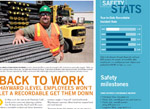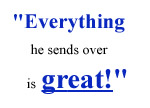 Boeing Chairmen and CEO Phil Condit listens to questions with Jose Font, president of the Boeing Management Association, Everett, Wash., chapter.
Boeing Chairmen and CEO Phil Condit listens to questions with Jose Font, president of the Boeing Management Association, Everett, Wash., chapter.
Condit, Stonecipher
speak out
Phil: 'The aerospace industry is going to
change to a value-driven industry.
And that changes everything we do.'
Phil Condit and Harry Stonecipher recently made a number of observations to the Everett chapter of the Boeing Management Association. The event, also sponsored by the Boeing Center for Leadership & Learning, was broadcast live via the Boeing Education Network to 25 sites around the company as well as Australia. (Note: An accompanying story -- about Stonecipher's speech -- was done by another reporter. It does not apear on this site.)
By Mark Ziegler
Boeing News
1998
Boeing is going through a fundamental transition that will determine the long-term viability of the company, Phil Condit, chairman and chief executive officer, told an international audience last week.
"I believe that every industry goes through very fundamental transitions," Condit said. "It is, in fact, those big external forces that change an industry and therefore cause companies to either change or get left behind."
Deregulation of the U.S. airline industry, with an accompanying reduction in fares, and the end of the Cold War, with an accompanying reduction in defense budgets, were two such major events impacting the industry, Condit noted.
For aerospace, Condit said, the first 75 years were defined by a constant push for performance, all in the effort to make planes go "higher, faster, farther."
In the future, the aerospace and defense industries will be defined by a push for value, he said.
"The aerospace industry is going to change to a value-driven industry," he said. "And that changes everything we do. It changes the way we design and build our products."
Engineers, he said, now need cost data just as much as they've needed weight data in the past.
And the company's financial, bill of materials, and parts ordering systems -- as well as the fundamental corporate culture -- must be changed to focus on value for customers.
"All of those things are in the plan we have in front of us," Condit said. "I believe we are embarked on an amazing journey."
"We have the right products," he said. "I think we are strategically positioned right where we want to be. We have the right people, we have the talent and the capability to do this. And we have the right plan. All we've got to do is execute the plan."
Doing so, he admitted, "is a huge task."
Later in response to questions from the audience, Condit offered various insights.
On how to restore confidence in leadership considering lagging production capability:
"The way you restore confidence -- we perform."
"Nothing does it like performance. We start delivering airplanes on time, that confidence comes back pretty fast."
On what happens if the transition to DCAC/MRM fails:
"There is no plan if DCAC/MRM fails. It can't."
Noting that 10 of the 11 biggest companies in the U.S. at the turn of the century -- all except General Electric -- no longer exist, Condit said, "Changing something as fundamental as the way you define and control your airplane configuration is traumatic in a company like this. But, I'm convinced that if we do it, we'll still be around in 20 years."
Condit said he's seeing progress.
"The first implementations of MRM were pretty darn rough, and we learned a whole bunch of lessons."
"The later ones got better."
"The last implementations, the lights didn't go out."
On Airbus' move, starting next year, from a nonstructural entity made up of a cooperative venture to a single corporate entity:
"I think it's probably a three-year process to bring it together, and it's not going to be easy. I think it gives us some real opportunities. While they are doing that, if we're moving ahead, we get to take advantage of that time."
On whether an I.A.M. strike can be avoided in 1999:
"I think so. It is not going to be easy. We're putting a lot of energy into it right now, pre-negotiations. I had a meeting with Tom Buffenbarger, the head of the International (International president of the International Association of Machinists and Aerospace Workers), last week. Both of us are dedicated to trying to get through 1999 without a strike."
"But, obviously, there are going to be a lot of issues. We're going to try to get ahead of it, get as much done up front, and not wait until we're into the negotiations."
On employee morale issues related to the merging of benefits packages:
"What we would like is a benefit package -- common across the company -- that allows the opportunity for people to move around."
"Overall, we have a very good benefit package. It is better than market."
On whether the outlook for ShareValue Trust is ominous:
"Well, it's not ominous, but it isn't exactly rosy."
"My guess is that we won't be up very much on this cycle, but we have a real shot over the next two years to do pretty darn well.
"It's up to us to go get it."





